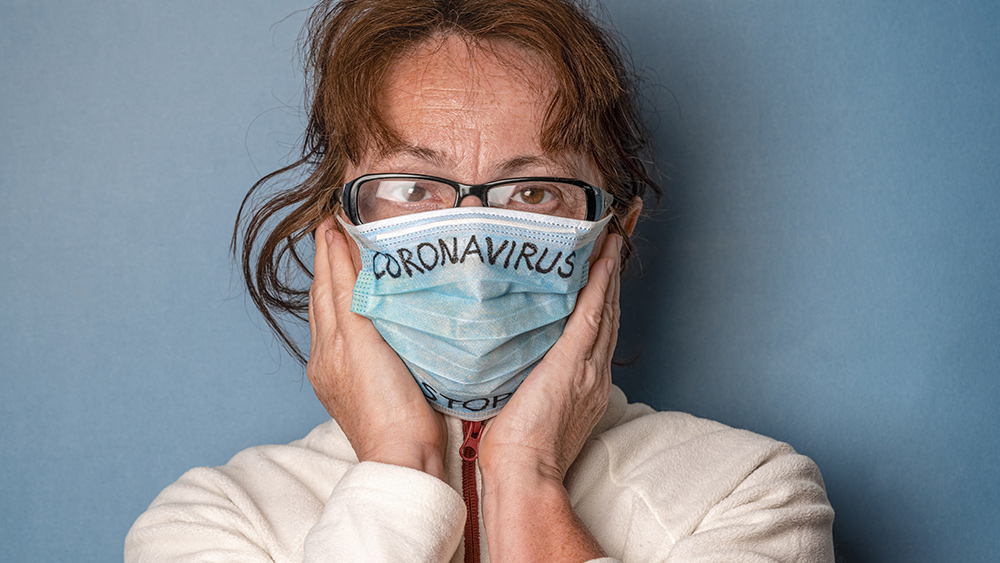How to keep your mental health in check while social distancing and self-quarantining to avoid coronavirus
04/28/2020 / By Zoey Sky

Governments around the world continue to enforce social distancing and stay-at-home orders to help “flatten the curve” or slow down the transmission rate of coronavirus. While these measures help protect you from infection, it’s important to consider another aspect of your well-being during this crisis: Your mental health.
Social distancing and staying home might significantly affect your mental health due to “cabin fever” or even feelings of loneliness. Therefore, it’s important to practice self-care during these troubling times to keep your overall well-being in check.
What is social distancing?
You may have heard of directives stating to keep at least six feet of physical space between yourself and other people when you’re out to buy groceries and on other essential trips. This is social distancing.
The first step in “flattening the curve” on coronavirus, the enforcement of social distancing rules has led to the cancellation or postponement of mass gatherings like concerts, sporting events, and even religious gatherings to protect public health.
In a 2006 study published in the journal Emerging Infectious Diseases, researchers reported that “social distancing policies are sketched to lessen the rise of pandemic flu without the aid of vaccination or over-the-counter drugs.”
According to Dr. Amesh A. Adalja, an infectious disease expert and senior scholar at the Johns Hopkins Center for Health Security, you can practice social distancing by staying home. This is the reason why many people are now working from home, schools have moved online, and people are “hanging out” via video calls.
Adalja noted that social distancing recommendations are altered if you’re among those most at risk of getting infected, such as the elderly and immunocompromised. If you belong to either of these groups, you need to be stricter when limiting your contact with others.
How do you self-quarantine?
Social distancing, self-isolation and self-quarantine share one similarity: They all limit your personal and social contact, but on different levels.
Self-isolation separates sick people from others who are healthy. It can happen with or without medical supervision.
Self-quarantine separates and restricts the movement of people who aren’t sick yet, but could have been exposed to the virus. Being quarantined will determine if you were exposed if you get sick after some time has passed.
Whether you’re self-isolating or self-quarantining for coronavirus, you must stay home and limit contact with family members to prevent further spread of the virus.
Follow the tips below for effective self-quarantining:
- Rest and get enough sleep.
- Stay hydrated.
- Wash your hands thoroughly using soap and water or those are not available, hand sanitizer.
- Do not share personal items with other people in your household.
- Sanitize household surfaces regularly.
If you don’t feel well, stay in your own room and sleep alone.
While self-quarantining, monitor yourself for symptoms and get in touch with a healthcare professional once you start experiencing symptoms associated with COVID-19. Symptoms like coughing, fever and shortness of breath can occur at least two to 14 days after exposure to coronavirus.
If you’re already sick and must travel for essential reasons, wear a face mask and limit your contact with other people when outside.
How to practice self-care while on lockdown
You may suffer from stress and anxiety due to the drastic effects of the coronavirus pandemic on your everyday life, but it is important to stay calm and exercise caution to protect yourself and your loved ones.
Follow the tips below to manage your stress and anxiety while staying home on lockdown:
- Try meditation or yoga. Like others around the world, you may be feeling anxious and scared about the current public health crisis. Practice mindfulness to ground yourself, try yoga or start meditating. Yoga will teach you how to relax, release tension and strengthen weak muscles. Practicing yoga regularly may even help ease anxiety and improve your overall mood.
- Get quality sleep. Getting good, restful sleep each night supports immune health and allows your body to recover after a tiring and stressful day.
- Use social media to stay in touch. If you’re apart from your family and close friends, set up a regular video call and spend meaningful time with each other.
- Do meaningful things. Your job is important, but once you’re done working from home, try to do one task that is meaningful to you. Read a book you’ve always wanted to finish or start a new hobby.
- Do things that make you laugh. The coronavirus pandemic is a serious matter, but keeping your sense of humor is crucial for your mental health. Limit the time you spend reading news reports about the disease and if you’re particularly anxious, play with your pets or watch a funny movie to lighten the mood.
Social distancing and self-quarantining may cause negative emotions like stress or anxiety. When you’re feeling overwhelmed, take a breather and practice these self-care tips, so you may maintain both physical and mental health amid the COVID-19 pandemic.
Sources include:
Submit a correction >>
Tagged Under:
anxiety relief, coronavirus, covid-19, how-to, infections, mental health, mind body science, outbreak, pandemic, prevention, protective measures, Public Health, remedies, self-care, self-quarantine, sleep, sleep quality, social distancing, stress management, superbugs, viral infection, virus
This article may contain statements that reflect the opinion of the author
RECENT NEWS & ARTICLES
Infections.News is a fact-based public education website published by Infections News Features, LLC.
All content copyright © 2018 by Infections News Features, LLC.
Contact Us with Tips or Corrections
All trademarks, registered trademarks and servicemarks mentioned on this site are the property of their respective owners.





















